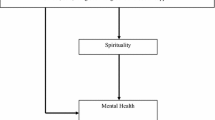Abstract
The following study examined the perceptions of spirituality and life satisfaction of 13 adults residing in a rural region of Southern U.S. The study sought to address the research question, “What is the perception of spirituality and life satisfaction among multicultural adults in Southern U.S.?” To explore the question, a generic qualitative design was used. In conclusion of the study, data was analyzed using a theoretical thematic analysis through which seven themes emerged. The following are themes that developed through analysis: (a) foundation in Christ, (b) feelings of peace and contentment, (c) guidance and security, (c) connection with others, (d) way of living/purpose, (e) spiritual practices, and lastly, (f) spiritual conflict.
Similar content being viewed by others
References
Albanese, C. L. (2001). American spiritualities: A reader. Indiana University Press.
Baetz, M., & Toews, J. (2009). Clinical implications of research on religion, spirituality, and mental health. The Canadian Journal of Psychiatry, 54(5), 292–301. https://doi.org/10.1177/070674370905400503.
Boles, J. B. (1972). The Great Revival: Beginnings of the Bible Belt. The University Press of Kentucky.
Bronfenbrenner, U. (1979). The ecology of human development: Experiments by nature and design. Harvard University Press.
Chatters, L., Taylor, R., & Lincoln, K. (1999). African American religious participation: A multi-sample comparison. Journal for the Scientific Study of Religion, 38, 132–145.
Clarke, P. (1990). The world’s religions: Islam. Routledge.
Cowan, T. D. (1996). Shamanism as a spiritual practice for daily life. Crossing Press.
Craig, C., Weinert, C., Walton, J., & Derwinski-Robinson, B. (2006). Spirituality, chronic illness, and Rural Life. Journal of Holistic Nursing, 24(1), 27–35.
Creswell, J. W. (2007). Qualitative inquiry and research design: Choosing among five traditions (2nd ed.). Sage.
Dean, K. J. (2013). Religious involvement, life satisfaction, and spiritual well-being among young adults in a black church (Doctoral dissertation). Retrieved from ProQuest LLC (3567148).
Fine, M. (1985). Intervention from a systems ecological perspective. Professional Psychology: Research and Practice, 16(2), 262–270.
Fowler, J. W. (1995). Stages of faith: The psychology of human development and the quest for meaning. Harper One.
Fox, J., Rovnyak, M., & Barnett, R. (2014). Barriers to help-seeking for mental health disorders in a rural impoverished population. Community Mental Health Journal, 37, 421–436.
Gergen, K. J., Josselson, R., & Freeman, M. (2015, Jan.). The promises of qualitative inquiry. American Psychologist, 70(1), 1–9.
Gillespie, A. (2014). International Environmental Law, Policy, and Ethics. https://doi.org/10.1093/acprof:oso/9780198713456.001.0001.
Hall, S., & Gjesfjeld, C. (2013). Clergy: A partner in rural mental health? Journal of Rural Mental Health, 37(1), 50–57.
Hamer, D. (2004). The God gene: How faith is hardwired into our genes. Doubleday.
Heyrman, L. (2013). Southern Cross: The beginnings of the Bible Belt (1 St). Alfred A. Knopf, Inc.
Hirsch, J., & Cukrowicz, K. (2014). Sept.). Suicide in rural areas: An updated review of the literature. Journal of Rural Mental Health, 38(2), 65–78.
Kavar, L. F. (2015). Spirituality and the sense of self: An inductive analysis. The Qualitative Report, 20(5), 697–711.
Koenig, H. (2012). Religion, spirituality, and health: The research and clinical implications. ISRN Psychiatry, 2012, Article ID 278730. Retrieved from https://doi.org/10.5402/2012/278730.
Koltko-Rivera, M. E. (2006). Rediscovering the later version of Maslow’s hierarchy of needs: Self-Transcendence and opportunities for Theory, Research, and Unification. Review of General Psychology, 10(4), 302–317. https://doi.org/10.1037/1089-2680.10.4.302.
Leedy, P. D., & Ormrod, J. E. (2010). Practical research: Planning and design (9th ed.). Prentice Hall.
Lun, M. C. V., & Bond, M. H. (2013). Examining the relation of religion and spirituality to subjective well-being across national cultures. Psychology of Religion and Spirituality, 5(4), 304–315.
Lynch, T. G. (2016). Exploring the perception of spirituality and sense of life satisfaction in adult men and women in rural southern U.S. (dissertation). ProQuest.
Moustakas, C. (1994). Phenomenological research methods. Sage.
Nakray, K. (2015). Social Science Research Ethics for a Globalizing World A critical overview of Interdisciplinary and cross-cultural perspectives (1st ed.). Routledge.
Newberg, A., & Waldman, M. (2009). How god changes your brain: Breakthrough findings from a leading neuroscientist. Ballantine Books.
Percy, W., Kostere, K., & Kostere, S. (2015). Generic qualitative research in psychology. The Qualitative Report, 20(2), 76–85.
Richards, P., & Worthington, E. (2010). The need for evidence-based, spiritually oriented psychotherapies. Professional Psychology: Research and Practice, 41(5), 363–370.
Riding-Malon, R., & Werth, J. L. (2014). Psychological practice in rural settings: At the cutting edge. Professional Psychology: Research and Practice, 45(2), 85–91. https://doi.org/10.1037/a0036172.
Sue, D. W., Bingham, R. P., Porché-Burke, L., & Vasquez, M. (1999). The diversification of psychology: A multicultural revolution. American Psychologist, 54(12), 1061–1069. https://doi.org/10.1037//0003-066x.54.12.1061.
Walsh, R. (2011). Lifestyle and mental health. American Psychologist, 66(7), 579–592.
Worthington, E. L., Hook, J. N., Davis, D. E., & Jennings, D. J. (2013). Christian accommodative cognitive therapy for depression. In Evidence-based practices for Christian counseling and psychotherapy (pp. 81–100). Essay, IVP Academic, an imprint of InterVarsity Press.
Worthington, E. L. Jr., Johnson, E. L., Hook, J. N., & Aten, J. D. (2013). Evidenced-based practices for Christian Counseling and Psychotherapy. InterVarsity Press.
Author information
Authors and Affiliations
Corresponding author
Ethics declarations
Competing Interests
The authors affirm that there are no competing interests.
Additional information
Publisher’s Note
Springer Nature remains neutral with regard to jurisdictional claims in published maps and institutional affiliations.
Rights and permissions
Springer Nature or its licensor (e.g. a society or other partner) holds exclusive rights to this article under a publishing agreement with the author(s) or other rightsholder(s); author self-archiving of the accepted manuscript version of this article is solely governed by the terms of such publishing agreement and applicable law.
About this article
Cite this article
Lynch, T.G., Clark, A. Exploring the Perception of Spirituality and Sense of life Satisfaction in Adult Men and Women in Rural Southern U.S.. Applied Research Quality Life (2024). https://doi.org/10.1007/s11482-024-10282-4
Received:
Accepted:
Published:
DOI: https://doi.org/10.1007/s11482-024-10282-4




